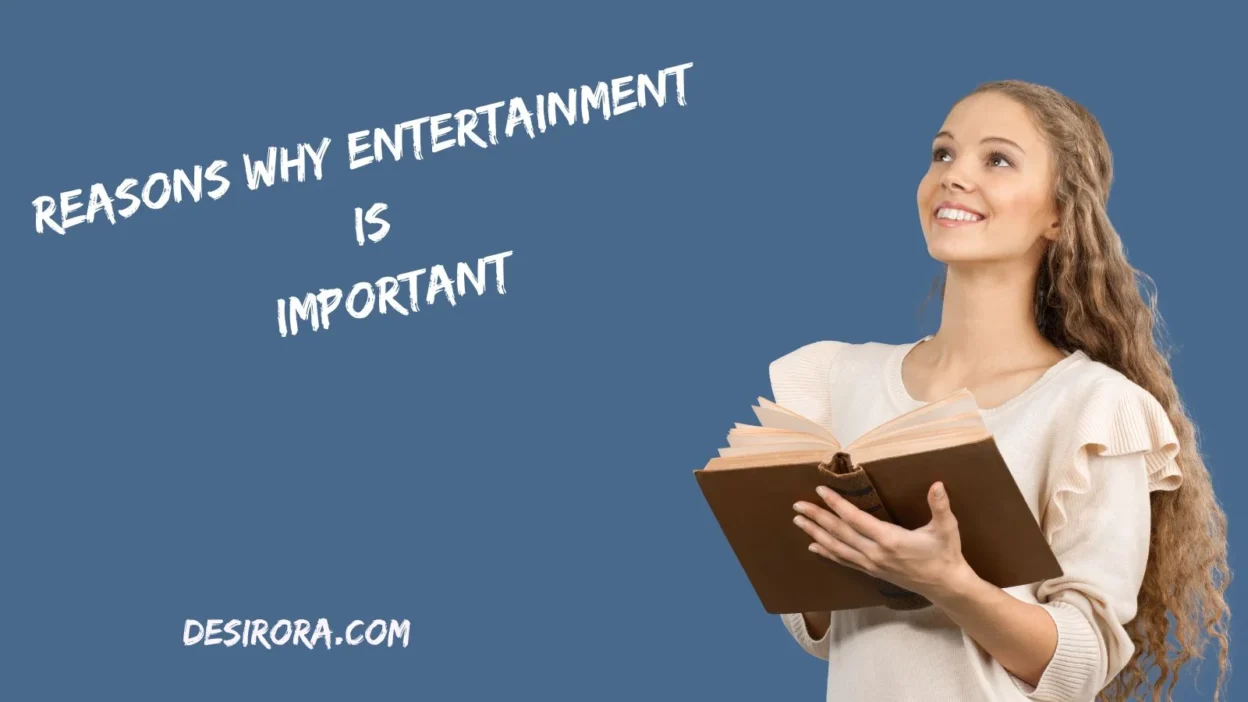Entertainment is more than just a way to pass time—it plays a crucial role in mental, emotional, social, and even professional aspects of life. From watching a funny movie to attending a live concert, entertainment serves as a powerful tool for stress relief, creativity, social bonding, and cultural exploration.
In this article, we’ll dive deep into the reasons why entertainment is important, its benefits, and how you can incorporate it effectively into your daily life.
Understanding Entertainment and Its Role in Our Lives
Entertainment refers to activities designed to engage, amuse, and enrich individuals. It can include:
- Watching movies, TV-series, or documentaries
- Listening to music or podcasts
- Playing games, puzzles, or interactive shows
- Attending live events, concerts, and theatrical performances
- Partaking in hobbies like dancing, painting, or gardening
Whether at home or in a social setting, entertainment provides a much-needed break from daily stressors. It’s a way to unwind, relax, and refresh the mind, making everyday tasks more manageable and life more enjoyable.
Example: After a long day of work or studies, watching a light-hearted comedy or listening to your favorite music can instantly boost your mood and help you feel more energized.
Entertainment as a Source of Stress Relief
Stress is an inevitable part of modern life. Deadlines, responsibilities, and personal challenges can weigh heavily on the mind. Entertainment provides a safe and effective way to manage stress and maintain mental health.
Key stress-relief benefits include:
- Relaxation: Movies, music, and reading can help calm the mind and reduce anxiety.
- Escapism: Engaging in entertaining activities allows temporary escape from daily worries.
- Laughter: Comedy shows, funny movies, and stand-up performances release endorphins, which are natural mood boosters.
Quote: As Charlie Chaplin once said, “A day without laughter is a day wasted.”
Real-life Usage: Families watching movies together or friends attending live concerts often report feeling more relaxed and connected after the experience.
Emotional and Psychological Benefits of Entertainment
Entertainment is deeply intertwined with emotions and psychological wellbeing. It can evoke a wide range of emotions from joy to sadness, and help us process pent-up feelings safely.
Emotional benefits include:
- Catharsis: Sad or tear-jerking films provide a safe outlet to experience and release emotions.
- Empowerment: Watching stories of courageous heroes or heroines can inspire confidence and courage.
- Mood improvement: Music and interactive games can boost happiness and emotional balance.
| Entertainment Type | Emotional Benefit | Example |
| Comedy Show | Laughter, stress relief | Stand-up comedy special |
| Drama Movie | Emotional release, empathy | Tear-jerking film |
| Music | Mood enhancement, nostalgia | Listening to favorite childhood songs |
| Interactive Games | Engagement, focus, cognitive stimulation | Puzzles, brain teasers |
Boosting Creativity and Inspiration Through Entertainment
Entertainment doesn’t just relax the mind—it can also spark creativity and generate ideas.
- Music and art can inspire new ways of thinking.
- Watching innovative films or documentaries can expose you to different perspectives and ideas.
- Creative play through games, writing, or improvisation encourages problem-solving and innovation.
Example: Many renowned inventors and artists credit exposure to music, theater, or literature as a source of inspiration for their creative breakthroughs.
Social Benefits: Connecting and Bonding with Others
Entertainment is a powerful social tool. Sharing experiences creates common ground and fosters stronger relationships.
Ways entertainment enhances social life:
- Bonding with family and friends over movies or games
- Creating shared memories at concerts, festivals, or sporting events
- Building confidence and social skills through participation in performances or interactive workshops
Idioms in context: “Laughter is the best medicine” perfectly applies here, as shared humor and enjoyment strengthen social connections.
Real-life Example: Discussing a recent concert or movie with colleagues or friends often sparks engaging conversations and deeper connections.
Cultural Exploration and Appreciation Through Entertainment
Entertainment is a window into diverse cultures, values, traditions, and beliefs.
- Documentaries and historical dramas teach us about global history.
- International films and music expose us to new cultures.
- Festivals and cultural events foster appreciation for diversity.
Synonym Table for Cultural Entertainment:
| Term | Synonym / Related Concept |
| Cultural exploration | Cultural immersion, global insight |
| Traditions | Customs, rituals, practices |
| Values | Beliefs, principles |
| Arts | Creative expressions, performances |
Economic Contributions of the Entertainment Industry
Entertainment isn’t just personal—it has significant economic value.
- Job creation: The arts, media, and management sectors provide employment opportunities.
- Stimulates economy: From ticket sales to merchandising, entertainment drives revenue.
- Corporate and professional growth: Conferences, trade shows, and live performances enhance brand engagement and productivity.
Example: The live music industry alone employs thousands and contributes significantly to local economies, while streaming platforms generate billions in revenue globally.
Educational and Cognitive Benefits of Entertainment
Entertainment can be highly educational and improve cognitive functions.
Benefits include:
- Memory and retention: Learning through storytelling, documentaries, and e-learning is more engaging and effective.
- Mental stimulation: Puzzles, quizzes, and brain teasers enhance cognitive function and problem-solving skills.
- Scientific and historical knowledge: Films and shows make learning enjoyable and memorable.
Real-life Example: Watching a historical drama or science documentary can spark curiosity and reinforce learning, turning knowledge retention into an enjoyable experience.
The Role of Entertainment in Professional and Corporate Settings
Entertainment has become a strategic tool in corporate events and professional gatherings.
- Team-building: Games and interactive sessions promote collaboration and morale.
- Corporate presentations and conferences: Using music, video, or live performances maintains attention and engagement.
- Branding and audience connection: Thoughtfully chosen entertainment can elevate company image and audience perception.
Example: Interactive keynote sessions or corporate galas often integrate entertainment to create a memorable and impactful experience for attendees.
Choosing the Right Form of Entertainment for Maximum Benefits
Selecting the right type of entertainment is essential for achieving desired effects.
Factors to consider:
- Purpose: Relaxation, learning, social bonding, or inspiration
- Audience: Age, interests, cultural background
- Format: Live, digital, interactive, or solo activities
- Duration and environment: Home, workplace, or public venue
Tip: Tailor entertainment thoughtfully to enhance mood, engagement, and personal growth.
Integrating Entertainment Into Daily Life for Wellbeing
Incorporating entertainment into your daily routine ensures mental, emotional, and social balance.
Practical tips:
- Daily breaks: Watch a short funny video or listen to music during work/study breaks
- Weekly social activities: Attend a concert or play board games with friends
- Hobby engagement: Bake, garden, or participate in arts to relieve stress and inspire creativity
- Virtual experiences: VR shows, online concerts, and interactive workshops offer accessible entertainment from home
Example: During the pandemic, many turned to online concerts, baking, and digital learning as a way to stay engaged and uplifted.
Conclusion
Entertainment is an indispensable aspect of human life. It provides stress relief, emotional catharsis, social bonding, cultural appreciation, cognitive stimulation, and even economic value. Whether through movies, music, games, or live events, entertainment enriches our lives, nurtures growth, and strengthens connections. By thoughtfully incorporating entertainment into our routines, we can enhance wellbeing, creativity, and overall happiness, making life more vibrant and fulfilling.
FAQs
Q1: Why is entertainment important for mental health?
Entertainment reduces stress, boosts mood, and provides emotional release, making it essential for mental wellbeing.
Q2: Can entertainment improve creativity?
Yes. Music, art, movies, and interactive activities stimulate the brain, sparking ideas and enhancing creative thinking.
Q3: How does entertainment foster social connections?
Shared experiences, like watching movies, attending concerts, or playing games, create common ground and strengthen relationships.
Q4: Is entertainment beneficial in education?
Absolutely. Learning through documentaries, stories, and interactive games enhances memory retention and makes information engaging.
Q5: How does the entertainment industry impact the economy?
It creates jobs, drives revenue, and stimulates various sectors like arts, media, and management, contributing significantly to economic growth.

Thomas Hardy is a passionate innovator and thoughtful leader, dedicated to transforming ideas into lasting success. With creativity and purpose, he brings vision and authenticity to everything he does.



